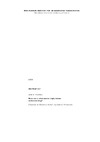Identificador persistente para citar o vincular este elemento:
https://accedacris.ulpgc.es/jspui/handle/10553/276
| Título: | Does more abstraction imply better understanding?: Apuntes de Mecánica Social, by Antonio Portuondo | Autores/as: | Pacheco Castelao, José Miguel | Clasificación UNESCO: | 12 Matemáticas 55 Historia |
Fecha de publicación: | 2008 | Publicación seriada: | Max Planck Institutte for the History of Science Preprints | Resumen: | This paper studies the contribution of the Spanish engineer and mathematician Antonio Portuondo to the mathematisation of Sociology in his 1912 book Apuntes de Mecánica Social1 –An Essay on Social Mechanics. Portuondo describes his approach to Sociology in the language of Rational Mechanics, translating sociological and psychological concepts, both for individuals and social groups, into mathematically tractable entities, and then proceeding to the derivation of a series of theorems and conclusions. The mathematical and physical content of Apuntes de Mecánica Social is analysed from a critical viewpoint, showing that the influence of Ernst Mach was a decisive one in the construction of the ideas expressed in the book. Curiously enough for an engineer, the main drawback of his approach is that the obtained results are not reinterpreted into actual sociological instances, for Antonio Portuondo sticks to abstract ideas with a minimum contact, if any, with real-word circumstances. The paper also contains some considerations on the role of Mathematics in the sociological research, and a description of a possible priority conflict with the Romanian scientist and politician Spiru Haret. | URI: | https://accedacris.ulpgc.es/handle/10553/276 | ISSN: | 0948-9444 | Fuente: | Max Planck Institutte for the History of Science Preprints [ISSN 0948-9444], n. 351 |
| Colección: | Artículos |
Visitas
202
actualizado el 15-ene-2026
Descargas
123
actualizado el 15-ene-2026
Google ScholarTM
Verifica
Comparte
Exporta metadatos
Los elementos en ULPGC accedaCRIS están protegidos por derechos de autor con todos los derechos reservados, a menos que se indique lo contrario.
